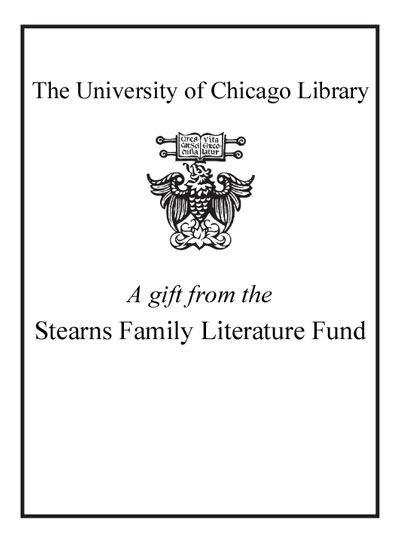Good form : the ethical experience of the Victorian novel /
Saved in:
| Author / Creator: | Rosenthal, Jesse, author. |
|---|---|
| Imprint: | Princeton, New Jersey : Princeton University Press, [2017] ©2017 |
| Description: | xii, 256 pages ; 25 cm |
| Language: | English |
| Subject: | |
| Format: | Print Book |
| URL for this record: | http://pi.lib.uchicago.edu/1001/cat/bib/10956333 |
MARC
| LEADER | 00000cam a2200000Ii 4500 | ||
|---|---|---|---|
| 001 | 10956333 | ||
| 003 | ICU | ||
| 005 | 20170125165210.3 | ||
| 008 | 160613t20172017nju b 001 0 eng d | ||
| 040 | |a ERASA |b eng |e rda |c ERASA |d BDX |d IAL |d OCLCF |d OCLCQ |d PIT |d NAM |d MUU |d NhCcYBP | ||
| 020 | |a 9780691171708 |q hardcover | ||
| 020 | |a 069117170X |q hardcover | ||
| 035 | |a (OCoLC)951724648 | ||
| 050 | 4 | |a PR878.E67 |b R67 2017 | |
| 082 | 0 | 4 | |a 823/.809 |2 23 |
| 100 | 1 | |a Rosenthal, Jesse, |e author. |0 http://id.loc.gov/authorities/names/n89666668 |1 http://viaf.org/viaf/40990756 | |
| 245 | 1 | 0 | |a Good form : |b the ethical experience of the Victorian novel / |c Jesse Rosenthal. |
| 246 | 3 | 0 | |a Ethical experience of the Victorian novel |
| 264 | 1 | |a Princeton, New Jersey : |b Princeton University Press, |c [2017] | |
| 264 | 4 | |c ©2017 | |
| 300 | |a xii, 256 pages ; |c 25 cm | ||
| 336 | |a text |b txt |2 rdacontent |0 http://id.loc.gov/vocabulary/contentTypes/txt | ||
| 337 | |a unmediated |b n |2 rdamedia |0 http://id.loc.gov/vocabulary/mediaTypes/n | ||
| 338 | |a volume |b nc |2 rdacarrier |0 http://id.loc.gov/vocabulary/carriers/nc | ||
| 504 | |a Includes bibliographical references (pages 235-249) and index. | ||
| 520 | 8 | |a What do we mean when we say that a novel's conclusion "feels right"? How did feeling, form, and the sense of right and wrong get mixed up, during the nineteenth century, in the experience of reading a novel? Good Form argues that Victorian readers associated the feeling of narrative form--of being pulled forward to a satisfying conclusion--with inner moral experience. Reclaiming the work of a generation of Victorian "intuitionist" philosophers who insisted that true morality consisted in being able to feel or intuit the morally good, Jesse Rosenthal shows that when Victorians discussed the moral dimensions of reading novels, they were also subtly discussing the genre's formal properties. For most, Victorian moralizing is one of the period's least attractive and interesting qualities. But "Good Form" argues that the moral interpretation of novel experience was essential in the development of the novel form--and that this moral approach is still a fundamental, if unrecognized, part of how we understand novels. | |
| 505 | 0 | |a Introduction: "Moralised Fables" -- What feels right: Ethics, intuition, and the experience of narrative -- The subject of the Newgate novel: Crime, interest, what novels are about -- Getting David Copperfield: Humor, sesus communis, and moral agreement -- Back in time: The Bildungsroman and the source of moral agency -- The large novel and the law numbers: Daniel Deronda and the counterintuitive -- Afterword -- Notes -- Bibliography -- Index. | |
| 650 | 0 | |a Ethics in literature. |0 http://id.loc.gov/authorities/subjects/sh94004075 | |
| 650 | 0 | |a English literature |y 19th century |x Criticism and interpretation. | |
| 650 | 0 | |a English fiction |y 19th century |x Criticism and interpretation. | |
| 650 | 7 | |a English fiction. |2 fast |0 (OCoLC)fst00910817 | |
| 650 | 7 | |a English literature. |2 fast |0 (OCoLC)fst00911989 | |
| 650 | 7 | |a Ethics in literature. |2 fast |0 (OCoLC)fst00915860 | |
| 648 | 7 | |a 1800-1899 |2 fast | |
| 655 | 7 | |a Criticism, interpretation, etc. |2 fast |0 (OCoLC)fst01411635 | |
| 903 | |a HeVa | ||
| 929 | |a cat | ||
| 999 | f | f | |i 89e34ecc-87d5-5efb-923e-52ffaa92d1e3 |s 4d926370-18b1-576d-aa38-f1b5f5a34e6e |
| 928 | |t Library of Congress classification |a PR878.E67 R67 2017 |l JRL |c JRL-Gen |i 9428064 | ||
| 927 | |t Library of Congress classification |a PR878.E67 R67 2017 |l JRL |c JRL-Gen |e stea |b 113288812 |i 9713795 | ||

